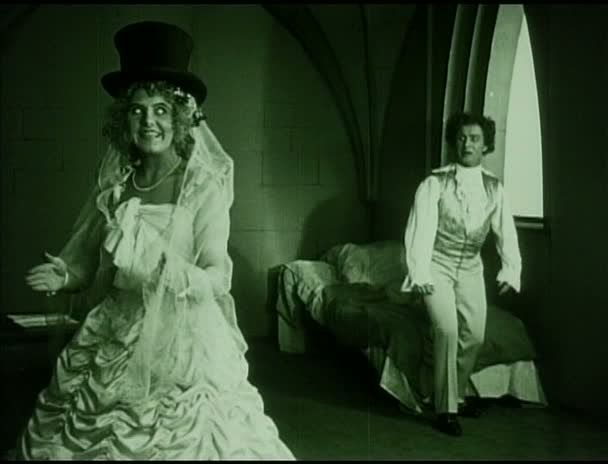
Ernst Lubitsch's Die Puppe is a delightfully kinky and absurd silent fantasia, a charming artifact of the master director's tenure in the German film industry before his emigration to Hollywood. Fast-paced and funny, it's a brilliant farce, a madcap and surreal confection that's a pleasure from start to finish. It's a celebration of artificiality and theatricality that opens with Lubitsch himself introducing the film by setting up a cardboard diorama, suggesting that he's about to act out a kind of cinematic puppet show.
Indeed, that's an appropriate reference point for a film that consistently deals with the slipping boundaries between the real and the artificial. This story of a girl mistaken for a doll takes place against a backdrop of blatantly cardboard sets, these flimsy-looking surroundings adding to the atmosphere of a strange fantasy, a children's puppet show with an adult theme. Lancelot (Hermann Thimig) is a fey and painfully shy young man who happens to be the only heir of his uncle, a wealthy baron (Max Kronert) who wants Lancelot to get married so that their line will carry on. The problem is that Lancelot is terrified of women, as evidenced by the comic chase sequence that results when a crowd of forty women come looking for the heir, pursuing him in their fever for such a prestigious marriage. Lancelot manages to escape to a monastery where he hides out, until his uncle puts out a newspaper ad promising a big dowry for Lancelot if he returns and gets married.
The greedy, corrupt monks concoct a clever and ridiculous plan: Lancelot will pretend to marry a life-like doll, get the money, and bring it back to the monastery. The only problem is that the doll, a perfect likeness of the dollmaker's daughter Ossi (Ossi Oswalda), is broken and replaced by the real girl, who pretends to be a doll while Lancelot carts her off for the fake wedding. What ensues is an utterly lunatic farce packed with naughty gags and innuendos. Oswalda delivers a delightful performance as the girl playing a doll, her face agilely contorting into gleeful grins and eye-rolling expressions of disdain whenever her hapless new husband isn't looking. She's clearly enjoying her ruse, and the wedding scene especially is packed with charming moments, as whenever Lancelot's back is turned, Ossi — who as a doll isn't getting any food or drink — grabs glasses of champagne to swig and gobbles down any food on the plates he leaves unattended.

There's also plenty of sexual subtext here. Lancelot's fear of women is absurd and caricatured, as he runs in terror from the hordes of women who desire him. He's so skittish that he even flinches away from the chorus line of dolls who dance and pose for him in the dollmaker's shop; when the dolls kick up their legs, he buries his head in his arms, crying that it's too risque. He's assiduously proper to the point of repression, and it's only with what he thinks is a fake woman — and a better-behaved one than those bold dancers — that he can get used to the idea of spending time with a woman. Lubitsch plays up the naughty subtext of this "doll" seducing and toying with the man: he starts to undress her and she resists, miming that she can dress herself, and later he undresses in front of her, using her extended arms as a coat rack, much to her annoyance. For Lancelot, marriage makes him quake in terror, and he enters into it in the most unromantic fashion. He buys his wife — with the understanding that he'll be paid back and then some for marrying her, making marriage a transaction twice over.
Lubitsch surrounds this sexual farce with a toy box aesthetic that enforces the essential unreality of the whole affair. A paper moon hangs in the sky at night, its frown turning to a grin when it sees the doll kiss the man. Lancelot rides his bride to their wedding in a carriage drawn, hilariously, by some of the most unconvincing fake horses ever imagined, obviously consisting of a pair of men inside a costume, with their legs sticking out of the cloth. As the coach driver prepares to depart, he notices that one of these "horses" has lost its tail, and without fuss he stoops down, picks it up, and reattaches it. It's a wonderful little moment that would break the film's fourth wall if there were really any to break in the first place, and it's also a sign of the lightness and playfulness of Lubitsch's approach. He lets all of the film's seams show, especially in its elaborate painted sets — every bit as stylized and expressionist as the next year's The Cabinet of Dr. Caligari, albeit in a very different way.
Die Puppe suggests just how early in Lubitsch's career the director's brilliant comedic sensibility was developed. Clever, witty, and sophisticated, this is pure Lubitsch, a delightfully fluffy and fun comedy with a bit of a wicked edge to its sugary aesthetic.

No comments:
Post a Comment